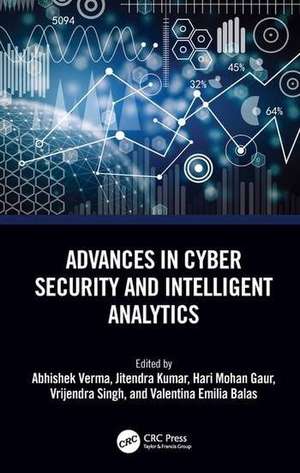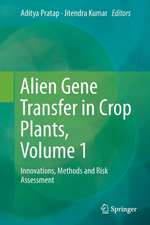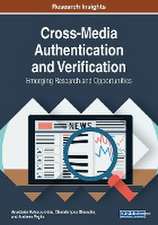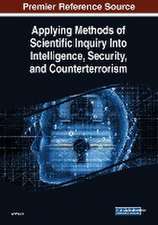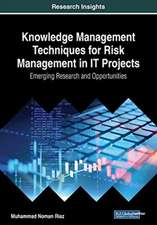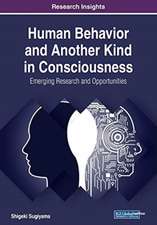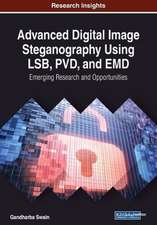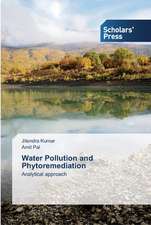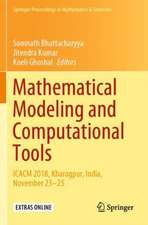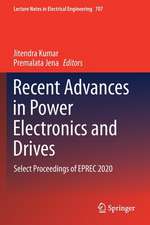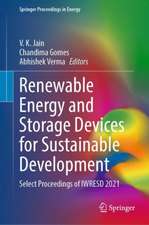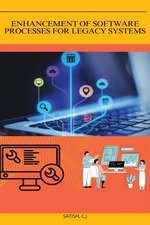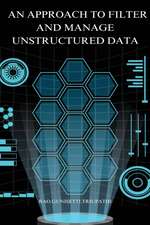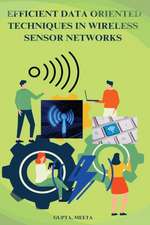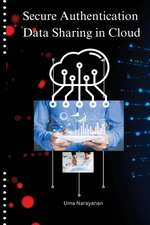Advances in Cyber Security and Intelligent Analytics
Editat de Abhishek Verma, Hari Mohan Gaur, Jitendra Kumar, Valentina Emilia Balas, Vrijendra Singhen Limba Engleză Hardback – 21 dec 2022
| Toate formatele și edițiile | Preț | Express |
|---|---|---|
| Paperback (1) | 366.63 lei 6-8 săpt. | |
| CRC Press – 7 oct 2024 | 366.63 lei 6-8 săpt. | |
| Hardback (1) | 696.26 lei 3-5 săpt. | +25.61 lei 4-10 zile |
| Taylor & Francis Ltd. – 21 dec 2022 | 696.26 lei 3-5 săpt. | +25.61 lei 4-10 zile |
Preț: 696.26 lei
Preț vechi: 765.11 lei
-9% Nou
Puncte Express: 1044
Preț estimativ în valută:
133.24€ • 144.68$ • 111.93£
133.24€ • 144.68$ • 111.93£
Carte disponibilă
Livrare economică 01-15 aprilie
Livrare express 15-21 martie pentru 35.60 lei
Preluare comenzi: 021 569.72.76
Specificații
ISBN-13: 9781032216003
ISBN-10: 103221600X
Pagini: 292
Ilustrații: 33 Tables, black and white; 78 Line drawings, black and white; 7 Halftones, black and white; 85 Illustrations, black and white
Dimensiuni: 241 x 162 x 22 mm
Greutate: 0.6 kg
Editura: Taylor & Francis Ltd.
ISBN-10: 103221600X
Pagini: 292
Ilustrații: 33 Tables, black and white; 78 Line drawings, black and white; 7 Halftones, black and white; 85 Illustrations, black and white
Dimensiuni: 241 x 162 x 22 mm
Greutate: 0.6 kg
Editura: Taylor & Francis Ltd.
Notă biografică
Prof. Abhishek Verma is an Assistant Professor in the Department of Computer Science & Engineering at IIIT Jabalpur, India (an institution of national importance). He obtained a Ph.D degree (2020) on the Internet of Things security from the National Institute of Technology Kurukshetra, Haryana, India. He has more than seven years of experience in research and teaching. He has published several research articles in international SCI/SCIE/Scopus journals and conferences of high repute. He is an editorial board member of Research Reports on Computer Science (RRCS) and active review board member of various reputed journals, including IEEE, Springer, Wiley, and Elsevier. His current areas of interest include Information Security, Intrusion Detection, and the Internet of Things.
Dr. Jitendra Kumar is an Assistant Professor in the Department of Computer Applications, National Institute of Technology Tiruchirappalli, Tamil N¿du, India (an institution of national importance) since May 2020. He earned his doctorate in Machine Learning and Cloud Computing from the National Institute of Technology Kurukshetra, Haryana, India in 2019. His research interests include Time Series Forecasting, Machine Learning, Evolutionary Algorithms, Cloud Management, and Optimization. He has authored and published a significant number of research articles in peer-reviewed and indexed journals and conferences of high repute. He has also authored a book on Machine Learning for Cloud Management. He has received three awards including best paper awards in international conferences. He is a senior member of IEEE and a member of several other IEEE societies, including CIS, TCCLD, and SIGHT. He is also a member of ACM and MIR Labs. He is an active review board member of various journals and conferences of repute such as IEEE Transactions on Parallel and Distributed Systems, IEEE Transactions on Computers, IEEE Systems Journal, IEEE Access, IJCNN, FUZZ-IEEE, and CEC.
Dr. Hari Mohan Gaur is currently in the School of Computer Science Engineering and Technology, Bennett University, India. He obtained Ph.D. from National Institute of Technology Kurukshetra, India in the area of Reversible and Quantum Computing. Hari Mohan Gaur has more than 15 years of experience in academic and research where he has also served on roles of administrative capacities. He is a distinguished researcher, well known in Academic Fraternity for his interdisciplinary research in the areas of Quantum Computation, Fault Tolerant Digital Design, IOT and Data Security in Cloud Environment. Dr. Gaur holds the credit of contribution in several quality research journals of international repute. He has received three awards including best paper awards in a peer reviewed international conference. He is a member of IEEE and several other societies of IEEE.
Prof. Vrijendra Singh is presently working as Professor at the Department of Information Technology at Indian Institute of Information Technology, Allahabad. He has over 20-plus years of experience in academics (teaching/training), research & development, and consulting. He has also worked at Dept. of Electrical Engineering, IIT Kanpur; as Senior Project Associate, Ecole Polytechnique Federale de lausanne (EPFL), Switzerland; as Visiting Research Faculty; and consultant to Putera Sampoerna Foundation, Jakarta (2012) for Course curriculum development in IT and allied areas. He has authored over 85 publications in reputed international journals, conference proceedings/book chapters, and edited one book. Currently, he is serving as Chairman, IEEE Computational Intelligence Society, UP Section, India, Advisor to Network Power Solution Enterprise, New Delhi, India, collaborator to NavAjna Technologies Pvt. Ltd., Hyderabad, India, and Consultant to Pragmalytics Technologies, Kochi, India.
Prof. Valentina Emilia Balas is currently a Full Professor in the Department of Automatics and Applied Software at the Faculty of Engineering, ¿Aurel Vlaicü University of Arad, Romania. She holds a Ph.D. Cum Laude, in Applied Electronics and Telecommunications from Polytechnic University of Timisoara. Dr. Balas is an author of more than 350 research papers in refereed journals and International Conferences. Her research interests are in Intelligent Systems, Fuzzy Control, Soft Computing, Smart Sensors, Information Fusion, Modeling and Simulation. She is the Editor-in Chief to International Journal of Advanced Intelligence Paradigms (IJAIP) and to International Journal of Computational Systems Engineering (IJCSysE), member in Editorial Board member of several national and international journals and is evaluator expert for national, international projects and Ph.D. Thesis. Dr. Balas is the director of Intelligent Systems Research Centre in Aurel Vlaicu University of Arad and Director of the Department of International Relations, Programs and Projects in the same university. She served as General Chair of the International Workshop Soft Computing and Applications (SOFA) in nine editions organized in the interval 2005¿2020 and held in Romania and Hungary. Dr. Balas participated in many international conferences as Organizer, Honorary Chair, Session Chair, member in Steering, Advisory or International Program Committees and Keynote Speaker. Now she is working in a national project with EU funding support: BioCell-NanoART ¿ Novel Bioinspired Cellular Nano-Architectures ¿ For Digital Integrated Circuits, 3M Euro from National Authority for Scientific Research and Innovation. She is a member of European Society for Fuzzy Logic and Technology (EUSFLAT), member of Society for Industrial and Applied Mathematics (SIAM) and a Senior Member IEEE, member in Technical Committee e Fuzzy Systems (IEEE Computational Intelligence Society), Chair of the Task Force 14 in Technical Committee e Emergent Technologies (IEEE CIS), member in Technical Committee e Soft Computing (IEEE SMCS). Dr. Balas was past Vice-president (responsible with Awards) of IFSA ¿ International Fuzzy Systems Association Council (2013¿2015), is a Joint Secretary of the Governing Council of Forum for Interdisciplinary Mathematics (FIM) ¿ a Multidisciplinary Academic Body, India, and recipient of the ¿Tudor Tanasescü Prize from the Romanian Academy for contributions in the field of soft computing methods (2019).
Dr. Jitendra Kumar is an Assistant Professor in the Department of Computer Applications, National Institute of Technology Tiruchirappalli, Tamil N¿du, India (an institution of national importance) since May 2020. He earned his doctorate in Machine Learning and Cloud Computing from the National Institute of Technology Kurukshetra, Haryana, India in 2019. His research interests include Time Series Forecasting, Machine Learning, Evolutionary Algorithms, Cloud Management, and Optimization. He has authored and published a significant number of research articles in peer-reviewed and indexed journals and conferences of high repute. He has also authored a book on Machine Learning for Cloud Management. He has received three awards including best paper awards in international conferences. He is a senior member of IEEE and a member of several other IEEE societies, including CIS, TCCLD, and SIGHT. He is also a member of ACM and MIR Labs. He is an active review board member of various journals and conferences of repute such as IEEE Transactions on Parallel and Distributed Systems, IEEE Transactions on Computers, IEEE Systems Journal, IEEE Access, IJCNN, FUZZ-IEEE, and CEC.
Dr. Hari Mohan Gaur is currently in the School of Computer Science Engineering and Technology, Bennett University, India. He obtained Ph.D. from National Institute of Technology Kurukshetra, India in the area of Reversible and Quantum Computing. Hari Mohan Gaur has more than 15 years of experience in academic and research where he has also served on roles of administrative capacities. He is a distinguished researcher, well known in Academic Fraternity for his interdisciplinary research in the areas of Quantum Computation, Fault Tolerant Digital Design, IOT and Data Security in Cloud Environment. Dr. Gaur holds the credit of contribution in several quality research journals of international repute. He has received three awards including best paper awards in a peer reviewed international conference. He is a member of IEEE and several other societies of IEEE.
Prof. Vrijendra Singh is presently working as Professor at the Department of Information Technology at Indian Institute of Information Technology, Allahabad. He has over 20-plus years of experience in academics (teaching/training), research & development, and consulting. He has also worked at Dept. of Electrical Engineering, IIT Kanpur; as Senior Project Associate, Ecole Polytechnique Federale de lausanne (EPFL), Switzerland; as Visiting Research Faculty; and consultant to Putera Sampoerna Foundation, Jakarta (2012) for Course curriculum development in IT and allied areas. He has authored over 85 publications in reputed international journals, conference proceedings/book chapters, and edited one book. Currently, he is serving as Chairman, IEEE Computational Intelligence Society, UP Section, India, Advisor to Network Power Solution Enterprise, New Delhi, India, collaborator to NavAjna Technologies Pvt. Ltd., Hyderabad, India, and Consultant to Pragmalytics Technologies, Kochi, India.
Prof. Valentina Emilia Balas is currently a Full Professor in the Department of Automatics and Applied Software at the Faculty of Engineering, ¿Aurel Vlaicü University of Arad, Romania. She holds a Ph.D. Cum Laude, in Applied Electronics and Telecommunications from Polytechnic University of Timisoara. Dr. Balas is an author of more than 350 research papers in refereed journals and International Conferences. Her research interests are in Intelligent Systems, Fuzzy Control, Soft Computing, Smart Sensors, Information Fusion, Modeling and Simulation. She is the Editor-in Chief to International Journal of Advanced Intelligence Paradigms (IJAIP) and to International Journal of Computational Systems Engineering (IJCSysE), member in Editorial Board member of several national and international journals and is evaluator expert for national, international projects and Ph.D. Thesis. Dr. Balas is the director of Intelligent Systems Research Centre in Aurel Vlaicu University of Arad and Director of the Department of International Relations, Programs and Projects in the same university. She served as General Chair of the International Workshop Soft Computing and Applications (SOFA) in nine editions organized in the interval 2005¿2020 and held in Romania and Hungary. Dr. Balas participated in many international conferences as Organizer, Honorary Chair, Session Chair, member in Steering, Advisory or International Program Committees and Keynote Speaker. Now she is working in a national project with EU funding support: BioCell-NanoART ¿ Novel Bioinspired Cellular Nano-Architectures ¿ For Digital Integrated Circuits, 3M Euro from National Authority for Scientific Research and Innovation. She is a member of European Society for Fuzzy Logic and Technology (EUSFLAT), member of Society for Industrial and Applied Mathematics (SIAM) and a Senior Member IEEE, member in Technical Committee e Fuzzy Systems (IEEE Computational Intelligence Society), Chair of the Task Force 14 in Technical Committee e Emergent Technologies (IEEE CIS), member in Technical Committee e Soft Computing (IEEE SMCS). Dr. Balas was past Vice-president (responsible with Awards) of IFSA ¿ International Fuzzy Systems Association Council (2013¿2015), is a Joint Secretary of the Governing Council of Forum for Interdisciplinary Mathematics (FIM) ¿ a Multidisciplinary Academic Body, India, and recipient of the ¿Tudor Tanasescü Prize from the Romanian Academy for contributions in the field of soft computing methods (2019).
Cuprins
1 Edge computing-enabled secure information-centric networking: Privacy challenges, benefits, and future trends
KAVISH TOMAR, SARISHMA DANGI, AND SACHIN SHARMA
2 Weighted attack graphs and behavioral cyber game theory for cyber risk quantification
FLORIAN K. KAISER, MARCUS WIENS, AND FRANK SCHULTMANN
3 NetFlow-based botnet detection in IoT edge environment using ensemble gradient boosting machine learning framework
D. SANTHADEVI AND B. JANET
4 Exploring the possibility of blockchain and smart contract-based digital certificate
P. RAVI KUMAR, P. HERBERT RAJ, AND SHARUL TAJUDDIN
5 Senso Scale: A framework to preserve privacy over cloud using sensitivity range
NIHARIKA SINGH, ISHU GUPTA, AND ASHUTOSH KUMAR SINGH
6 Addressing the cybersecurity issues in cloud computing
SHIVANSHU OLIYHAN AND CHANDRASHEKHAR AZAD
7 Role of medical image encryption algorithms in cloud platform for teleradiology applications
SIJU JOHN AND S. N. KUMAR
8 Machine-learning approach for detecting cyberattacks in Medical Internet of Things
THULASI M. SANTHI AND M. C. HELEN MARY
9 Secure IoV-enabled systems at Fog Computing: Layout, security, and optimization algorithms and open issues
ANSHU DEVI, RAMESH KAIT, AND VIRENDER RANGA
10 A capability maturity model and value judgment systems for a distributed network of ethical and context aware digital twin agents
MEZZOUR GHITA, BENHADOU SIHAM, MEDROMI HICHAM, AND GRIGUER HAFID
11 A detailed cram on artificial intelligence industrial systems 4.0
P. DHARANYADEVI, R. SRI SAIPRIYA, T. C. ADITYAA, B. SENTHILNAYAKI, M. JULIE THERESE, A. DEVI, AND K. VENKATALAKSHMI
12 Ensuring liveliness property in safety-critical systems
ANKUR MAURYA, SHARAD NIGAM, AND DIVYA KUMAR
13 Machine learning for intelligent analytics
JYOTI POKHARIYA, PANKAJ KUMAR MISHRA, AND JYOTI KANDPAL
14 Secure 3D route optimization of combat vehicles in war field using IoV
ALOK NATH PANDEY, PIYUSH AGARWAL, AND SACHIN SHARMA
15 Healthcare therapy for treating teenagers with internet addiction using behavioral patterns and neuro-feedback analysis
B. DHANALAKSHMI, K. SELVAKUMAR, AND L. SAI RAMESH
16 Containerization in cloud computing for OS-level virtualization
MANOJ KUMAR PATRA, BIBHUDATTA SAHOO, AND ASHOK KUMAR TURUK
17 An adaptive deep learning approach for stock price forecasting
RESHMA MO, JITENDRA KUMAR, AND ABHISHEK VERMA
KAVISH TOMAR, SARISHMA DANGI, AND SACHIN SHARMA
2 Weighted attack graphs and behavioral cyber game theory for cyber risk quantification
FLORIAN K. KAISER, MARCUS WIENS, AND FRANK SCHULTMANN
3 NetFlow-based botnet detection in IoT edge environment using ensemble gradient boosting machine learning framework
D. SANTHADEVI AND B. JANET
4 Exploring the possibility of blockchain and smart contract-based digital certificate
P. RAVI KUMAR, P. HERBERT RAJ, AND SHARUL TAJUDDIN
5 Senso Scale: A framework to preserve privacy over cloud using sensitivity range
NIHARIKA SINGH, ISHU GUPTA, AND ASHUTOSH KUMAR SINGH
6 Addressing the cybersecurity issues in cloud computing
SHIVANSHU OLIYHAN AND CHANDRASHEKHAR AZAD
7 Role of medical image encryption algorithms in cloud platform for teleradiology applications
SIJU JOHN AND S. N. KUMAR
8 Machine-learning approach for detecting cyberattacks in Medical Internet of Things
THULASI M. SANTHI AND M. C. HELEN MARY
9 Secure IoV-enabled systems at Fog Computing: Layout, security, and optimization algorithms and open issues
ANSHU DEVI, RAMESH KAIT, AND VIRENDER RANGA
10 A capability maturity model and value judgment systems for a distributed network of ethical and context aware digital twin agents
MEZZOUR GHITA, BENHADOU SIHAM, MEDROMI HICHAM, AND GRIGUER HAFID
11 A detailed cram on artificial intelligence industrial systems 4.0
P. DHARANYADEVI, R. SRI SAIPRIYA, T. C. ADITYAA, B. SENTHILNAYAKI, M. JULIE THERESE, A. DEVI, AND K. VENKATALAKSHMI
12 Ensuring liveliness property in safety-critical systems
ANKUR MAURYA, SHARAD NIGAM, AND DIVYA KUMAR
13 Machine learning for intelligent analytics
JYOTI POKHARIYA, PANKAJ KUMAR MISHRA, AND JYOTI KANDPAL
14 Secure 3D route optimization of combat vehicles in war field using IoV
ALOK NATH PANDEY, PIYUSH AGARWAL, AND SACHIN SHARMA
15 Healthcare therapy for treating teenagers with internet addiction using behavioral patterns and neuro-feedback analysis
B. DHANALAKSHMI, K. SELVAKUMAR, AND L. SAI RAMESH
16 Containerization in cloud computing for OS-level virtualization
MANOJ KUMAR PATRA, BIBHUDATTA SAHOO, AND ASHOK KUMAR TURUK
17 An adaptive deep learning approach for stock price forecasting
RESHMA MO, JITENDRA KUMAR, AND ABHISHEK VERMA
Descriere
Descriere de la o altă ediție sau format:
The book highlights the challenges faced by emerging paradigms and presents the recent developments made to address the challenges. It presents a detailed study on security issues in distributed computing environments and their possible solutions, followed by applications of medical IoT, deep learning, IoV, healthcare, etc.
The book highlights the challenges faced by emerging paradigms and presents the recent developments made to address the challenges. It presents a detailed study on security issues in distributed computing environments and their possible solutions, followed by applications of medical IoT, deep learning, IoV, healthcare, etc.
